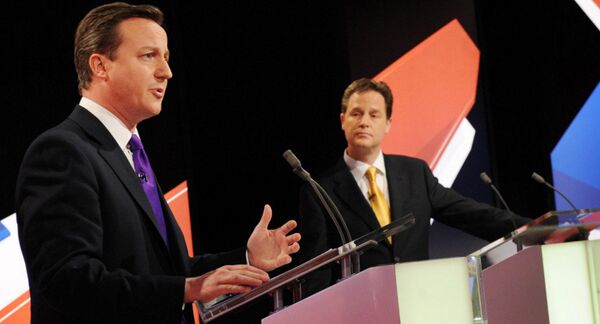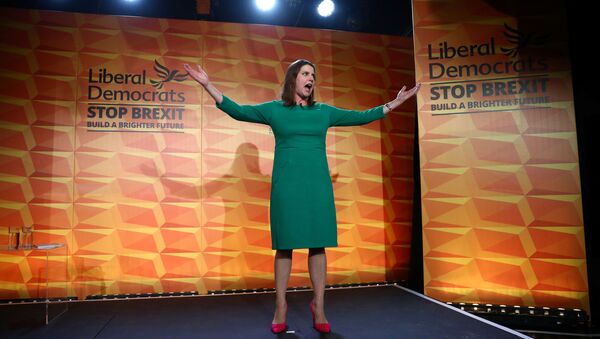The Liberal Democrat leader Jo Swinson could hold the balance of power on 13 December if her party gets close to the 57 seats which Nick Clegg had when he got into bed with David Cameron in 2010.
Swinson has opted for a “Full Remain” position and has said she would ignore the 2016 referendum and revoke Article 50 altogether, cancelling Brexit if she wins the election and forms a government.
But that will not happen and the best she can hope for is for her party to be the third biggest in Parliament, winning even more seats than the Scottish Nationalist Party (SNP) which currently has 35 and is hoping to win a dozen from the Conservatives.
This is a recipe for no-deal at the end of 2020. Liberal Democrats can deprive the Conservatives of a majority and stop them pushing through no-deal Brexit. https://t.co/Lhak5wldbU
— Jo Swinson (@joswinson) November 24, 2019
Lib Dems Preferable to SNP As Coalition Partner?
The SNP would demand a second referendum on independence as their price for becoming a coalition partner and that is completely unpalatable to the Tories and fairly unpopular within the Labour Party too.
If there is another hung Parliament and neither Boris Johnson’s Conservatives nor Labour under Jeremy Corbyn have an outright majority, then it is the Liberal Democrats that could be the most likely coalition partner.
But would the Lib Dems’ price be for propping up the Tories or Labour and would they drive a better bargain than they did in 2010.
The Conservatives had the most MPs that year - 306, compared to Labour’s 258 - but the incumbent prime minister Gordon Brown tried hard to woo Nick Clegg, who he felt was a progressive leader and had more in common with Labour than the Tories.
Did Cameron Betray Clegg?
But Clegg felt it would be unfair and undemocratic to cheat Conservative voters out of their victory and agreed to become a junior partner in a coalition with David Cameron after several days of negotiations in the Downing Street Rose Garden.

What concessions did Clegg win?
He became Deputy Prime Minister and several senior Liberal Democrats got Cabinet jobs - Vince Cable at the Department for Business, Chris Huhne at the Department for Energy and Climate Change, Danny Alexander as Scottish Secretary and David Laws as Chief Secretary to the Treasury.
Huhne would be forced to quit in 2012 after he tried to get his wife to take penalty points for a motoring offence and was eventually convicted of perverting the course of justice. He was replaced by Ed Davey, who challenged Swinson for the party leadership earlier this year.
Laws, who had a secret gay lover, also resigned after an expenses scandal and was replaced by Alexander.
Still Paying the Price Of Coalition Austerity
Swinson herself was a junior minister and has been given a tough time recently in TV debates for voting in favour of austerity.
— Jon Hollis (@JonHollis9) November 22, 2019
The Lib Dems’ biggest victory - or so they thought - was on proportional representation (PR), which they had campaign in favour of for years.
Under the First Past The Post system which is currently used in the UK smaller parties do not get their “fair share” of MPs.
In the May 2010 general election the Liberal Democrats got 6,836,824 votes - less than two million less than Labour - but they only got 57 MPs elected, compared to 258 Labour parliamentarians.
So Clegg thought he had pulled off a major coup when he persuaded Cameron to agree to a referendum on switching to PR.
as reported in the guardian's live blog, lib dem justice secretary phillip lee appears to rule out a coalition with labour, but leaves the door open for a coalition with the conservatives pic.twitter.com/M7QDkW2tOl
— Shaun (@shaun_vids) November 19, 2019
But he was naive and did not insist the Conservatives campaigned for PR or stay neutral on the issue.
In the event the vast majority of Tories in the Cabinet threw the weight behind the No vote, as did the Labour Party, and the proposed change was rejected in a 2011 referendum by 13 million votes to six million.
What Would Swinson's 'Bride Price' Be?
So what could Jo Swinson ask for if she becomes a kingmaker?
Firstly she may demand more important Cabinet posts - Health? Education? Even the Home Office, so they could drive through their controversial policy to legalise cannabis.
If Labour were in power they might go along with the legalisation of cannabis, but it is hard to see the Tories swallow it.
Another key demand would be trying to stop Brexit.
If the Tories had the most seats they would ask Boris Johnson to delay his “getting Brexit done” and put his deal to a second referendum.
Today I confronted @joswinson in Glasgow - how ironic that’s she’s in one of the cities that is most affected by austerity that she enabled. I know many people who are suffering from what the Lib Dem’s done while in coalition with the tories. #GE2019 #GeneralElection2019 https://t.co/tCuzge2kqA
— Jay Sutherland (@Jay_Sutherland_) November 22, 2019
This is something Johnson is unlikely to stomach and he would probably call for another general election rather than accept it.
But if Corbyn won, would Swinson try to ally with Labour’s Remain wing and try to get a Labour/Lib Dem coalition government to campaign against Brexit in a second referendum?
Corbyn announced earlier this week he intended to stay neutral during a second referendum campaign but Swinson might try to push him off the fence.
Pushing For PR Again?
If the Lib Dems have learned from Clegg’s mistake, they will pressurise their coalition partner to pass legislation introducing a system of proportional representation.
Some might argue this was undemocratic as a referendum only eight years ago had clearly rejected it.
But Swinson could argue that the referendum only rejected the Alternative Vote (AV) system, which many find too complicated.
Under proportional representation, @TheGreenParty getting 7% of the vote at a general election would result in around 45 MPs.
— 💚 Tom Pashby for SW Herts 💚 (@TomPashby) November 25, 2019
Alas we are polling at ~3-4%, which, under PR would result in 19-26 MPs. We’ll likely get 1-3 MPs under first-past-the-post. #MakeVotesMatter #GE2019 https://t.co/k9ZkPNUYcl
So she might suggest the government pushes either the Single Transferable Vote (STV) system or Party List PR, which is used in Germany and many other countries.
Under the Party List system parties which get less than five percent of the vote do not get any representation in parliament.
That would have to be amended in the UK because the SNP, Plaid Cymru in Wales, the DUP and Sinn Fein in Northern Ireland, get far less than five percent of the national vote because they do not field candidates outside of their home country.
Opening The Door to Brexit Party
But a party list system would also boost the Brexit Party and other maverick groups which previously struggled to elect MPs under the First Past the Post System.
Reminded of the remark one Lib Dem MP made to me in 2015, that the problem is there is no electoral coalition for "Look, we made him take the knuckle duster *off* before we held your hands behind your back and let him punch you".... https://t.co/m4YuZxddPi
— Stephen Bush (@stephenkb) November 22, 2019
In 2014 UKIP’s Douglas Carswell won a by-election in 2014 after defecting from the Conservative Party, held onto the seat the following year but quit UKIP in 2017 and did not stand again that year. UKIP’s only other MP, Mark Reckless, lost to a Conservative at the 2015 election and is currently representing the Brexit Party in the Welsh National Assembly.
Whatever the outcome of the 2019 election Swinson will be hoping it will be significantly better than in 2017, when then leader Tim Farron won only 12 seats, a marginal improvement on 2015 when Swinson’s own husband Duncan Hames was one of 49 MPs who were swept out of power as voters punished the Lib Dems for their years in coalition.
Swinson knows that given the chance again they must make better choices when negotiations with a coalition senior partner.




